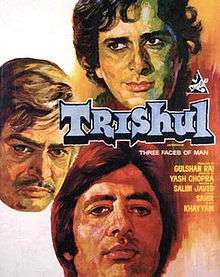Trishul (film)
| Trishul | |
|---|---|
 Film poster | |
| Directed by | Yash Chopra |
| Produced by | Gulshan Rai |
| Written by | Salim-Javed |
| Starring |
Sanjeev Kumar Amitabh Bachchan Shashi Kapoor Hema Malini Raakhee Waheeda Rehman Prem Chopra Poonam Dhillon |
| Music by | Khayyam |
| Cinematography | Kay Gee |
| Edited by | B. Mangeshkar |
| Distributed by |
Yash Raj Films Trimurti Films |
Release dates |
|
Running time | 168 mins |
| Country | India |
| Language | Hindi |
Trishul (Hindi: त्रिशूल, English: Trident) is an Indian action film directed by Yash Chopra and produced by Gulshan Rai in 1978. It is written by Salim-Javed, with music by Khayyam and lyrics by Sahir Ludhianvi. The movie was a "Super Hit" at the box office and one of the top grossers of 1978, along with Muqaddar Ka Sikandar and Don.[1]
The movie had previously inspired the Kamal Hassan starrer, Kadal Meengal and the Malayalam movie Meen starring Madhu and Jayan. The movie is remade in tamil as Mr. Bharath and it was also remade in Telugu with same name starring Shoban Babu.
The film focuses on the three intertwined stories of Amitabh, Sanjeev, and Shashi.
Plot
Raj Kumar Gupta (Sanjeev Kumar) gives up his first love Shanti (Waheeda Rehman) to marry a wealthy heiress Kamini (Gita Siddharth) who is the daughter of Seth Dindayal. Shanti comes by to wish him success on his marriage with the news that she is carrying his child and moving away. She gives birth to a boy and names him Vijay. She raises him to adulthood. After she dies, Vijay (Amitabh Bachchan) comes to Delhi to take revenge by destroying his father's business and family connections. Shekhar (Shashi Kapoor) and Kusum (Poonam Dhillon) are Vijay's half-siblings who are caught in the crossfire of Vijay's revenge. Vijay also crosses paths with Geeta (Raakhee), the devoted secretary of Gupta and another company's general manager Sheetal (Hema Malini) who is also the daughter of the owner of the company. When Geeta is fired Vijay hires her. He tries to create differences between Shekhar and Sheetal. Vijay also takes all the good deals which resulted in losses for Raj. He even encourages Kusum to marry Ravi (Sachin) against her father's wishes which enrages Shekhar and he ends up fighting with Vijay. But Geeta comes and tells the truth. Shekhar and Kusum leave Raj. Raj in anger tells Balwant (Prem Chopra) to kill Vijay. Later Vijay comes down and tells him that he is Raj's son and leaves. Raj tries to stop Balwant but he had already left and kidnapped Ravi in order to get to Vijay. Vijay, with the assistance of Shekhar and Raj, rescues Ravi. Balwant aims at Vijay but Raj comes in between and thus Raj is shot in the process by Balwant. Before dying Raj asks for forgiveness. Vijay forgives him and unites with the family. In addition, Vijay changes the name of his company from Shanti Constructions to Shanti-Raj Constructions.
Cast
- Amitabh Bachchan as Vijay Kumar
- Sanjeev Kumar as Raj Kumar Gupta / R. K. Gupta
- Shashi Kapoor as Shekhar Gupta
- Raakhee as Geeta
- Hema Malini as Sheetal Verma
- Poonam Dhillon as Kusum Gupta / Babli
- Sachin as Ravi
- Waheeda Rehman as Shanti
- Prem Chopra as Balwant Rai
- Iftekhar as P.L. Verma
- Gita Siddharth as Kamini Gupta
- Manmohan Krishna as Seth Dindayal
- Yunus Parvez as Bhandari
- Mohan Sherry as Gangoo
- M. B. Shetty as Madhav Singh
- Manik Irani as Henchman
Credits
- Director – Yash Chopra
- Producer – Gulshan Rai
- Production company – Trimurti Films
- Writer – Salim-Javed
- Art director – Desh Mukherjee
- Chief assistant director – Ramesh Talwar
- Editor – B. Mangeshkar
- Lyrics – Sahir Ludhianvi
- Singers – K. J. Yesudas, Kishore Kumar, Lata Mangeshkar, Nitin Mukesh & Pamela Chopra
Soundtrack
All the songs[2] were composed by Khayyam and lyrics were penned by Sahir Ludhianvi.
The soundtrack for this movie is credited for bringing the three legends of Indian film music K. J. Yesudas, Kishore Kumar, Lata Mangeshkar together in a single song "Mohabbat Bade Kaam Ki Cheez Hai".
| # | Title | Singer(s) | Duration |
|---|---|---|---|
| 1 | "Gapoochi Gam Gam" | Lata Mangeshkar, Nitin Mukesh | 04:09 |
| 2 | "Ja Ri Behna Ja" | Yesudas, Pamela Chopra, Kishore Kumar | 03:05 |
| 3 | "Jo Ho Yaar Apna" | Lata Mangeshkar, Kishore Kumar | 03:29 |
| 4 | "Mohabbat Bade Kam Ki" | Lata Mangeshkar, Yesudas, Kishore Kumar | 04:38 |
| 5 | "Janeman Tum Kamal Karte Ho" | Lata Mangeshkar, Kishore Kumar | 05:37 |
| 6 | "Aap Ki Maheki Hui Zulf Ko" | Lata Mangeshkar, Yesudas | 03:09 |
| 7 | "Tu Mere Saath Rahega" | Lata Mangeshkar | 06:29 |
Awards and Nominations
- 1979 Filmfare Awards - Nominated[3]
In popular culture
The movie was heavily referenced in Anurag Kashyap's 2012 crime film Gangs of Wasseypur.[4] A Sinhala Film with an almost similar story line was made with title "Hello Shyama" by Director and ace cameraman of all time, M.S.Anandan, Starring Gamini Fonseka in the role Of Sanjeev and Shyama Anandan, daughter of M S Anandan' in the role played by Amitabh Bachchan.
References
- ↑ "India Box-office 1978".
- ↑ "Trishul (1978): Lyrics and videos of songs". Retrieved March 5, 2016.
- ↑ 1st Filmfare Awards 1953
- ↑ Deccan Chronicle http://www.deccanchronicle.com/channels/showbiz/movie-reviews/gangs-wasseypur-review-gangster-e-azam-sorts-054. Missing or empty
|title=(help)
External links
- Trishul at the Internet Movie Database